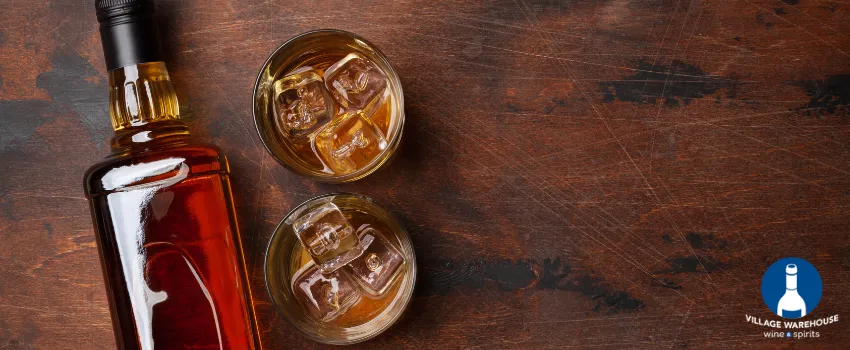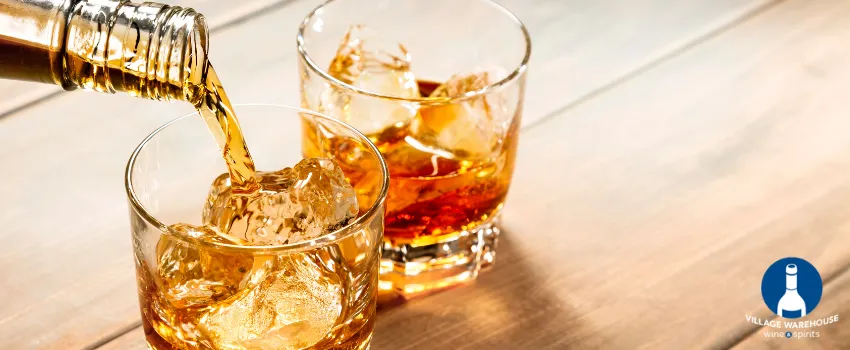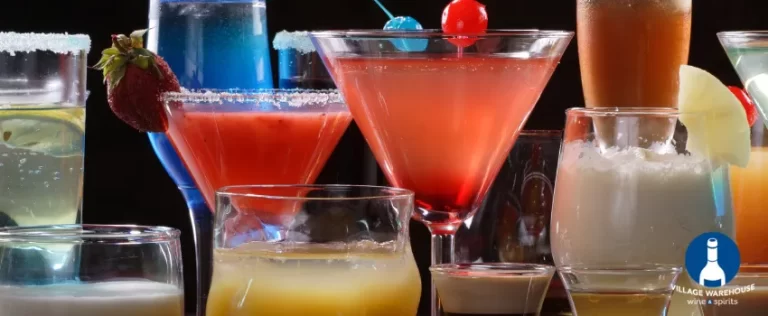Many people don’t know the differences between Scotch and Bourbon.
While both share the whiskey label and originate from distinct parts of the globe, they possess unique characteristics. From the ingredients used in their production to their flavor profiles, significant differences contribute to their individuality.
You’re not alone if you want to know the differences between Bourbon and Scotch. With countless sources of information available online, navigating the details and opinions can be overwhelming. That’s why we’ve crafted this comprehensive guide to help shed light on the distinctive qualities of each.
What Is Whiskey?
Whiskey, or whisky, is a distilled alcoholic beverage made from fermented grain mashes. The grains commonly used in whiskey production include wheat, corn, barley, and rye. The exact combination of grains and the production process can vary depending on the type of whiskey being produced.
Whiskey is a broad term that encompasses various styles and traditions from different regions worldwide. The term “whiskey” is popular in the United States and Ireland, while people in Scotland, Japan, and Australia refer to it as “whisky.”
Regardless of the spelling, whiskey production involves aging the spirit in wooden casks or barrels, typically with charred oak surfaces.
What Is the Difference Between Scotch and Bourbon?
Bourbon and Scotch are types of whiskey. They are both popular around the globe and are known to have strong flavors, but that is where their similarities stop. They have different taste profiles, mainly due to the grains used.
Here are some of the other differences between Scotch and Bourbon:
1. They are made in different places.
For a whiskey to be legally called Bourbon, it should be made in any state in the country. This rule contradicts many people’s belief that it is only made in Kentucky. However, the limestone water in Kentucky makes it an ideal place for producing Bourbon. The water in this area has natural mineral water that filters out impurities, such as iron.
Scotch, as the name implies, is only made in Scotland. It is, by law, to be distilled and matured in the said country. Although some liquors — such as Japanese whisky — have similarities with Scotch, they aren’t called Scotch since they aren’t made in Scotland.
2. They’re made from different ingredients.
One significant Scotch and Bourbon difference is the grain composition.
Although both are made from grain mashes, the U.S. government is strict regarding Bourbon. It must be made using a grain mixture of at least 51% corn. The remaining percentage can be either malted wheat, barley, rye, or a combination.
On the other hand, the primary ingredient of Scotch is malted barley, along with yeast and water. For coloring purposes, Scottish people use other whole grains.
3. They have different alcohol-by-volume requirements.
Among the key differences between Bourbon and Scotch is their alcohol by volume (ABV) requirements.
While both spirits must be distilled and bottled with a minimum ABV of 40%, they have specific regulations regarding the maximum allowable ABV. For Scotch, the ABV must not exceed 94.8%. In contrast, Bourbon has a lower maximum ABV limit of 80%.
These ABV requirements reflect the different production regulations and traditions associated with them. Scotch is typically known for its wide range of ABV levels, including variations such as cask strength releases. Conversely, Bourbon tends to have a more standardized maximum ABV, ensuring a consistent drinking experience.
4. They have different aging processes.
Bourbon has no minimum aging requirement. However, to achieve a distinguished level of quality, it must be aged for at least two years. No flavors or coloring should be added to the Bourbon production during the aging process. In contrast, Scotch must be aged for at least three years to meet the legal requirements.
The variance in aging methods is due to the usual climate where the drinks are made. Bourbon ages faster because it’s made in Kentucky’s warm climate. The higher temperatures speed up the maturing process, so Bourbon ages about twice as fast. Alternatively, Scotch ages longer, allowing flavors and characteristics to develop gradually.
5. They taste different.
A straight answer to the question “What is the difference between Scotch and Bourbon?” is that they taste different. Although both have charred or smoky flavors, the source of these flavors sets them apart.
In the case of Scotch, the smoky notes come from the compounds released while drying malted barley over peat fires. On the contrary, Bourbon gets its smoky, oaky, and vanilla-like flavors from the charred surfaces of the barrels where it undergoes aging.
Bourbon vs. Scotch: Which Is Better?
There is no point in arguing about which of the two is better. Despite the many differences between Scotch and Bourbon, both taste great and have a loyal following. Even when you compare their nutritional content, both contain the same calories.
Additionally, both bring many health benefits, such as the following:
1. Provides antioxidants.
According to a 2007 study, whiskey contains antioxidants that help neutralize the body’s harmful free radicals.
2. Lowers uric acid levels.
A 2014 study found moderate whiskey consumption may help lower high uric acid levels. This reduction in uric acid can potentially decrease the risk of gout attacks.
3. Reduces risks of heart disease.
A 2014 review also suggests that moderately drinking alcoholic beverages, including whiskey, decreases the likelihood of heart disease.
4. Promotes brain health.
Moderate consumption of alcohol, including whiskey, is also linked to reduced risks of dementia, according to a recent 2023 study.
Is Scotch Easier to Drink Than Bourbon?
When it comes to whether Scotch is easier to drink than Bourbon, it’s all about personal preference and taste. Both offer unique flavor profiles, highlighting the Scotch and Bourbon difference. What one person finds easier to drink, another might not.
People like Scotch for its flavors, including smoky, fruity, and floral notes, which some people may find more approachable. Alternatively, people often describe Bourbon as having a sweeter and richer taste, which can also appeal to many individuals.
Ultimately, the ease of drinking depends on individual taste preferences and the specific characteristics of each whiskey. Some people may find the smoothness and complexity of Scotch more enjoyable, while others may prefer the sweet and robust flavors of Bourbon.
The Bottom Line
The differences between Scotch and Bourbon don’t make either less than the other. If anything, their differences make them unparalleled in flavor. The variations in flavor between them contribute to their charm and appeal. Whether you prefer the complex notes of Scotch or the rich characteristics of Bourbon, both spirits offer a delightful drinking experience.
Explore your love for spirits at Village Warehouse Wine and Spirits.
Indulge in the world of spirits by checking out Village Warehouse Wine and Spirits. By visiting our Avon liquor store today, you can discover an impressive selection of beverages as you delight in fine drinks. Our knowledgeable staff will tell you the differences between Scotch and Bourbon, and other liquors. Cheers to the joy of discovery!







